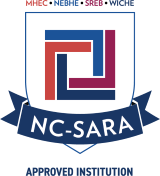Robeson Community College has been approved to participate in the National Council for State Authorization Reciprocity Agreements.

Online & Distance Education
RCC offers fully online programs that are the equivalent of our campus programs. They receive the same accreditation as campus programs and are taught by world-leading faculty.
Our online programs provide maximum schedule flexibility, allowing you to enhance your current workplace skills or prepare for a new career. For working learners or students unable to attend campus-based classes due to location or other life circumstances, RCC’s online education options provide a path to a better work/life balance.
Associate Degree Programs Available Fully Online
Diploma Programs Available Fully Online
- Bookkeeping
- Business Administration
Certificates Available Fully Online
- Bookkeeping
- Bookkeeping Data Management
- Business Administration General Certificate
- Business Foundations
- Customer Service
- Medical Office Administration – Patient Representative
- Criminal Justice Technology – Corrections Essentials
- Criminal Justice Technology – Court Foundations
- Criminal Justice Technology – Fundamental Principles of Law Enforcement
- Early Childhood Administration
- Early Childhood Associate
- Early Childhood Preschool
- Infant and Toddler Care
- What to Expect
- NEW ONLINE STUDENTS
- Policies & Authorization/Student Complaints
- Staff

Some students find that Distance Learning courses are more rigorous and require more preparation than the traditional courses – over eight hours of preparation time per week. Generally, students stay at home and take the course, but they may be required to come to campus for an orientation and for the completion of some requirements, like exams and oral presentations.
These courses are appealing because they allow more flexibility of instruction than traditional classes, are accessible to students at home or at work, and require few trips to campus. To help students remain current in their studies, faculty have established specific tests and assignment dates. Students must first decide if this delivery style is “right” for them and if they have time to take the course. Preparation time for these classes is MORE, not less.
- Instruction
-
Students who enroll in an online course should expect to complete homework assignments, participate in classroom discussion (discussion forums), and complete tests. Instructors also serve as a resource to the students by providing supplementary materials and by interacting with students in the discussion forums, online office hours or via e-mail/phone.
- Credit Hours
-
The credit hours of an online course are the same as on-campus classes. For example, both CIS 110-D1 (face-to-face setting) and CIS 110-0I (online setting) are three (3) credit hours. Registration procedures are the same; and students have access to the same services and library resources. A technology fee is assessed to all students, regardless of the type of class to which they may register.
Online learning courses may include any or all of the following:
- Instructor available by telephone, e-mail, or in person during specified hours
- Course syllabus outlining assignments, testing information, and other details about the course
- Textbook and/or study guide to direct and connect the reading and viewing assignments
- Online Office Hours
- Requirements
-
- Access to a computer at home or work
- Computer with Internet access
- Computer with up-to-date virus protection software
- Access to the required software for your course
- Knowledge of basic computer skills
- Ability to send e-mail with attachments
- A minimum of 8 hours a week to work on your course work
- Characteristics of Successful Online Students
-
- Mature
- Independent/Self Motivated
- Focused
- Disciplined
- Able to study independently
- Read and write well
- Turn in assignments when due
- Proficient in Windows, particularly word processing, email and web browser functions
- Committed/Goal-Oriented

RCC’s courses are offered through the Open Learning Management System (LMS), which allows you to:
- interact with other classmates in discussion forums and chats
- access supplemental lectures/materials
- complete assignments/tests
- view presentations from instructors
- ONLINE ATTENDANCE
-
Robeson Community College believes that students must attend class if they are to be well prepared for the workplace. Online courses are no different from traditional classroom courses in this regard. Online students are subject to the same attendance policy and procedures as traditional students. Please see the “Attendance Policy and Procedures” section of the Student Catalog & Handbook.
To document the initial enrollment in an online course, students are required to complete an “Enrollment Activity Assignment”. This assignment MUST be completed by the date designated by the instructor in the course, or the student will be dropped as a “Never Attend” without the possibility of reinstatement.
Attendance in online courses is defined as active participation in the course as described in the individual course syllabus. Online courses will, at a minimum, have weekly assignments to record student participation, which can be documented by any or all of the following methods:
- Completion of tests
- Submission/completion of assignments
- Participation in Discussion Forums
Students who fail to maintain active participation in an online course as defined in the course syllabus will be processed using the current attendance policy.
- PROCTOR
-
In some online and hybrid courses, instructors may require students to either visit campus at specified times and locations to take one or more examinations or to obtain an instructor approved proctor to administer exams. If a student is too far away from campus to take an examination onsite, it is the student’s responsibility to arrange to the proctor at a local university, library, or another suitable site. If the proctor option is selected, it is the responsibility of the student to obtain an acceptable proctor.
Students must submit names, positions, e-mail addresses, and phone numbers of the potential proctors and locations where exams are or can be administered. Proctors and locations must meet with the reasonable approval of the instructor. Once an instructor approves of a proctor and testing procedure, the RCC instructor will contact the proctor and arrange for delivery and return of the exam. The instructor, proctor, and student will agree upon the time and parameters under which the exam is given.
Students are responsible for any fees charged by proctors.
Qualified proctors may be:
• Administrators of recognized private testing centers
• Administrators or full-time faculty at accredited universities, colleges, or community colleges
• Principals, associate/assistant principals, and counselors of US public schools
• US Forces Military Commanders of Field Grade or above
• Education Services Officers on US military installations within the US or overseas
• US embassy or consulate officials
Qualified proctors may not be friends or family members!
Again, it is the student’s responsibility to obtain an acceptable proctor. The process of identifying a proctor, obtaining approval, and exam coordination take time. Students must make arrangements for a proctor and testing location at least two weeks prior to an examination. Failure to do so may result in a zero for the examination.
- REFUND
-
The policies relating to tuition refund for students are determined by the North Carolina Community College System Statewide Refund Policy for all North Carolina Community Colleges. Activity, lab, pre-college mathematics, and technology fees are not tuition-based and are non-refundable.
Tuition Refunds1. A refund shall not be made except under the following circumstances:
a. A 100 percent refund shall be made if the student officially withdraws prior to the first day of class(es) of the academic semester or term as noted in the college calendar. Also, a student is eligible for a 100 percent refund if the class in which the student is officially registered is canceled due to insufficient enrollment.
b. A 75 percent refund shall be made if the student officially withdraws from the class(es) prior to or on the official 10 percent point of the semester.
c. A student is not officially withdrawn from a course until a completed Drop Form has been submitted and processed by the Records Office. The effective date of withdrawal is the day the Records Office receives the completed form.
Examples to refund when dropping and adding classes:Drop/Add with no penalty after class(es) has started:
After the class(es) has started, students should complete all drop/add transactions in one process. If a student change(s) or drop(s) class(es), of equal hours during the same computer transaction, no additional cost will be incurred.
Drop/Add with a 75% refund after class(es) has started:If the number of hours dropped are greater than the number of hours added, the 75% refund policy will apply to the tuition cost for the hours dropped.
d. For classes beginning at times other than the first week (seven calendar days) of the semester a 100 percent refund shall be made if the student officially withdraws from the class prior to the first class meeting. A 75 percent refund shall be made if the student officially withdraws from the class prior to or on the 10 percent point of the class.
e. A 100 percent refund shall be made if the student officially withdraws from a contact hour class prior to the first day of class of the academic semester or term or if the college cancels the class. A 75 percent refund shall be made if the student officially withdraws from a contact hour class on or before the tenth calendar day of the class.
f. Students who have not officially withdrawn and have not attended at least once by the 10 percent date of the term will be dropped by the instructor as no tuition and fee adjustments/refunds will be made.
2. To comply with applicable federal regulations regarding refunds, federal regulations supersede the state refund regulations stated in this Rule.
3. When a student, having paid the required tuition for a semester, dies during that semester (prior to or on the last day of examinations of the college the student was attending), all tuition and fees for that semester may be refunded to the estate of the deceased.
4. For a class(es) which the college collects receipts which are not required to be deposited into the State Treasury account, the college shall adopt local refund policies.
Self Supporting Courses
Refunds/Cancellations/Never attend
1. A 100 percent of tuition paid will be refunded by the College if the student officially withdraws from the class prior to the first day of the term.
2. If student does not withdraw prior to the first day of the term and never attends the class, the student is still responsible for payment. No refunds will be granted.
3. A 100 percent of tuition paid will be refunded for any classes cancelled by the College.
Military Tuition Refund
Upon request of the student, each college shall:
1. Grant a full refund of tuition and fees to military reserve and National Guard personnel called to active duty or active duty personnel who have received temporary or permanent reassignments as a result of military operations then taking place outside the state of North Carolina that make it impossible for them to complete their course requirements; and
2. Buy back textbooks through the colleges’ bookstore operations to the extent possible. Colleges shall use distance learning technologies and other educational methodologies to help these students, under the guidance of faculty and administrative staff, complete their course requirements.
- State Authorization
-
STATE AUTHORIZATION INFORMATION

State Authorization is a legal issue dealing with a college’s adherence to state requirements for colleges to secure authorization to offer instruction in that state. Compliance with individual state requirements is now part of the Higher Education Opportunity Act of 2008, Amended 2010. Institutions offering distance education courses or programs must provide current and prospective students with the contact information for filing complaints with the college, its accrediting agency, and with the state agencies that handle complaints in the students’ state of residence.
Robeson Community College is currently authorized to offer Distance Learning courses in the following states:
Alabama Alaska Arizona Arkansas Colorado Connecticut Delaware District of Columbia Florida Georgia Hawaii Idaho Illinois Indiana Iowa Kansas Kentucky Louisiana Maine Maryland Missouri Montana Nebraska Nevada New Hampshire New Jersey New Mexico New York North Carolina North Dakota Ohio Oklahoma Oregon Pennsylvania Puerto Rico Rhode Island South Carolina South Dakota Tennessee Texas Utah Vermont Virginia Washington West Virginia Wisconsin Wyoming If you reside in a state not on this list, you are not eligible to register for online classes at RCC at this time. If you have questions, please contact our admissions office at admissions@robeson.edu.
Students residing outside of the State of North Carolina while taking online courses from Robeson Community College who desire to resolve an academic grievance or complaint should first follow Robeson Community College’s Student Complaint Process.
Robeson Community College Complaint Procedures
Students are advised to begin the process at the institutional level, please contact:
Dr. LaRonda Lowery
AVP for Instruction and Student Support Services
5160 Fayetteville Road
PO Box 1420
Lumberton, NC 28360
(910) 272-3305
lalowery@robeson.eduComplaint processes can be found in the RCC Catalog under the following sections:
-Academic Policies and Procedures Grade Appeals Process [opens in a new tab]
-General Information, Policies and Procedures General Student Complaint Policy [opens in a new tab]
If a complaint cannot be resolved through the institution’s complaint process, students may file a complaint with the North Carolina Post-Secondary Education Complaints unit. Please review the NC Post-Secondary Education Student Complaint Policy (opens in a new tab) and complete the NC Post-Secondary Education Complaint Form (opens in a new tab) and submit the complaint form online.
North Carolina Post-Secondary Education Complaints
c/o Student Complaints
223 S. West Street, Suite 1800
Raleigh NC 27603.For more information, call (919) 962-4550
Website: North Carolina Post-Secondary Education Complaints [opens in a new tab]
SACSCOC Student Complaint Process
If for some reason the complaint is not satisfactorily resolved, the next step would be to file a complaint with Robeson Community College’s accrediting agency. RCC is accredited by the Southern Association of Colleges and Schools Commission on Colleges (SACSCOC) to award associate degrees, diplomas, and certificates. Students who file a complaint with the accrediting agency should follow the SACSCOC Complaint Procedure [opens in a new tab].
The contact information for SACSCOC is:
1866 Southern Lane
Decatur, Georgia 30033-4097
Telephone: 404-679-4500
Website: http://www.sacscoc.org/SARA-NC Complaint Process
Students may also file a complaint through SARA-NC. SARA-NC (State Authorization Reciprocity Agreement – North Carolina). Students should follow the SARA-NC Complaint Process [opens in a new tab] and use the SARA-NC Complaint Form (PDF) [opens in a new tab].
SARA-NC Contact Information:
SARA North Carolina Director
NCSEAA
PO Box 41349
Raleigh, NC 27629
Telephone: (855) 727-2162
Email: complaint@saranc.org
Website: www.saranc.orgWhat about licensure and certification programs offered by Robeson Community College?
If you are considering a program at Robeson Community College that leads to licensure or certification and you do not live in North Carolina, please contact the individual below that corresponds to your desired program.
You may view the disclosure for each program or certificate to know which Robeson Community College program curriculum:
- meets state educational requirements for licensure or certification,
- does not meet state educational requirements for licensure or certification, or
- has not made a determination.
Curriculum Programs
Associate Degree Nursing (ADN)
Licensure Contact Information by State
Licensure Disclosure
Melissa Britt
5160 Fayetteville Road
PO Box 1420
Lumberton, NC 28360
mbritt@robeson.edu
910-272-3410Basic Law Enforcement Training
Licensure Contact Information by State
Licensure Disclosure
Terry Dimery
5160 Fayetteville Road
PO Box 1420
Lumberton, NC 28360
tdimery@robeson.edu
910-272-3480Cosmetology
Licensure Contact Information by State
Licensure Disclosure
Mary Ransom
5160 Fayetteville Road
PO Box 1420
Lumberton, NC 28360
mransom@robeson.edu
910-272-3422Early Childhood Education
Licensure Contact Information by State
Licensure Disclosure
Dr. Phoebe Chavis-Harris
5160 Fayetteville Road
PO Box 1420
Lumberton, NC 28360
pharris@robeson.edu
910-272-3448Emergency Medical Science
Licensure Contact Information by State
Licensure Disclosure
Thomas Byrd
5160 Fayetteville Road
PO Box 1420
Lumberton, NC 28360
tbyrd@robeson.edu
910-272-3408Medical Office Administration
Licensure Contact Information by State
Licensure Disclosure
Scottie Locklear
5160 Fayetteville Road
PO Box 1420
Lumberton, NC 28360
sclocklear@robeson.edu
910-272-3387Nurse Aide
Licensure Contact Information by State
Licensure Disclosure
Terri Oxendine
5160 Fayetteville Road
PO Box 1420
Lumberton, NC 28360
teoxendine@robeson.edu
910-272-3317Practical Nursing (LPN)
Licensure Contact Information by State
Licensure Disclosure
Marie Hedgpeth
5160 Fayetteville Road
PO Box 1420
Lumberton, NC 28360
mhedgpeth@robeson.edu
910-272-3403Radiography
Licensure Contact Information by State
Licensure Disclosure
Candice Ward
5160 Fayetteville Road
PO Box 1420
Lumberton, NC 28360
cward@robeson.edu
910-272-3409Respiratory Therapy
Licensure Contact Information by State
Licensure Disclosure
Kelli Heustess
5160 Fayetteville Road
PO Box 1420
Lumberton, NC 28360
kheustess@robeson.edu
910-272-3400Surgical Technology
Licensure Contact Information by State
Licensure Disclosure
Raetta Coleman
5160 Fayetteville Road
PO Box 1420
Lumberton, NC 28360
rcoleman@robeson.edu
910-272-3660Continuing Education Programs
Basic Law Enforcement Training
Licensure Contact Information by State
Licensure Disclosure
Peter Monteiro
5160 Fayetteville Road
PO Box 1420
Lumberton, NC 28360
pmonteiro@robeson.edu
910-272-3502Emergency Medical Services
Licensure Contact Information by State
Licensure Disclosure
Thomas Byrd
5160 Fayetteville Road
PO Box 1420
Lumberton, NC 28360
tbyrd@robeson.edu
910-272-3408Fire Education
Licensure Contact Information by State
Licensure Disclosure
Robert Ivey
5160 Fayetteville Road
PO Box 1420
Lumberton, NC 28360
rivey@robeson.edu
910-272-3329Health, Beauty, and Style Occupations
Please contact the following individual if you have questions regarding the following programs:
Angela Chavis
5160 Fayetteville Road
PO Box 1420
Lumberton, NC 28360
anchavis@robeson.edu
910-272-3319
Barbering
Licensure Contact Information by State
Licensure Disclosure
Computed Tomography
Licensure Contact Information by State
Licensure Disclosure
Magnetic Resonance Imaging
Licensure Contact Information by State
Licensure Disclosure
Manicurist
Licensure Contact Information by State
Licensure Disclosure
Massage Therapy
Licensure Contact Information by State
Licensure Disclosure
Pharmacy Technician
Licensure Contact Information by State
Licensure Disclosure
Phlebotomy
Licensure Contact Information by State
Licensure DisclosureMedical Occupations
Please contact the following individual if you have questions regarding the following programs:
Julie Baxley
5160 Fayetteville Road
PO Box 1420
Lumberton, NC 28360
jbbaxley@robeson.edu
910-272-3671
Administrative Medical Assisting
Licensure Contact Information by State
Licensure Disclosure
Notary Public
Licensure Contact Information by State
Licensure Disclosure
Real Estate
Licensure Contact Information by State
Licensure Disclosure
View the Licensure List to learn about the appropriate licensing or certification organization for your program.
Although we strive to connect you with the best information possible, Robeson Community College cannot confirm whether a particular program meets requirements for professional licensure and/or certification outside of the State of North Carolina.
In addition, NC SARA (National Council for State Authorization Reciprocity Agreement) has provided contact information for professional licensure offices in the United States for a limited number of academic disciplines.
Student Complaint Information by State and Agency [opens in a new tab]
THOMAS, JONICoordinator of Distance Learning | Building 4 |
|
IT Helpdesk |












